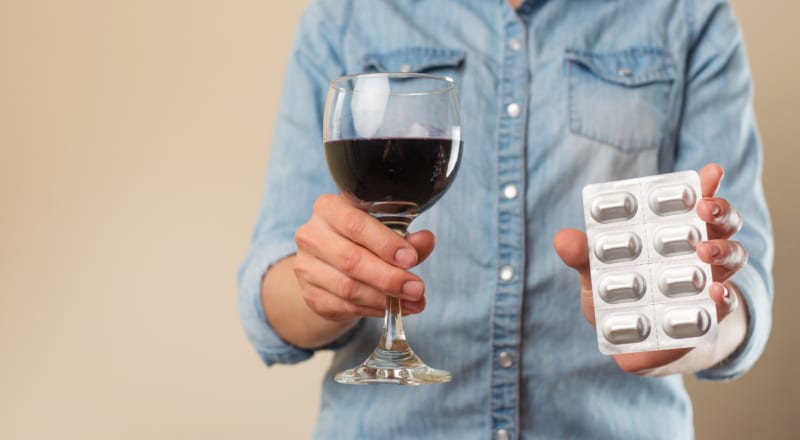What happens when you mix alcohol and antibiotics?
Different antibiotics react differently with alcohol. Some are very dangerous, while others have no effect.

People often assume that when they are on antibiotics that they can’t drink alcohol. Some antibiotics are dangerous when mixed with alcohol, while some have less severe side effects. If you are put on antibiotics speak to your doctor about the side-effects and whether or not you are allowed to drink alcohol while taking them. They will know what is best for you to do.
However, drinking alcohol when you are sick is usually not a good idea because alcohol affects your body negatively by impacting your immune system, sleep and health.
Can you mix alcohol and antibiotics?
Whether you can mix alcohol and antibiotics really depends on what kind of antibiotic you are taking. Each antibiotic is a different drug with different effects on your body.
Does the kind of antibiotic matter?
Mixing some kinds of antibiotics with alcohol can be very dangerous, others aren’t affected by alcohol at all. It is important to talk to your doctor or pharmacist about it and to find out if it is possible to drink alcohol on the antibiotics that you are on.
What happens when you drink alcohol on antibiotics?
Mixing alcohol and antibiotics can potentially have a variety of side effects. Some antibiotics can have dangerous side effects such as rapid heart rate, increased blood pressure and liver damage. Others side effects include a red and hot face and neck or flushing, excessive sweating, dizziness, headache, nausea and stomach issues.
Similarly common side effects of alcohol such as stomach problems, tiredness or headaches may be made worse by taking antibiotics at the same time.
You should never drink alcohol while you are taking any of the following antibiotics:
- Isoniazid
- Linezolid
- Metronidazole
- Tinidazole
- Cefoperazone
- Cefotetan
- Ketoconazole
- Doxycycline
- Erythromycin
- Griseofulvin (antifungal medication)
Isoniazid and linezolid
Drinking alcohol while taking these antibiotics can cause dangerous side effects such as:
- liver damage
- high blood pressure
These antibiotics are available as generic drugs. The branding and packaging may vary.
Metronidazole, tinidazole, cefoperazone, cefotetan, and ketoconazole (antifungal)
Mixing alcohol and these antibiotics can cause:
- fast heartbeat
- nausea
- vomiting
- flushing
- headache
- stomach cramps
Avoid drinking alcohol before, during, and up to three days after taking these.
Possible brand names of these antibiotics might include: Flagyl, Tindamax, Fasigyn, Simplotan, Cefobid, Apatef and Nizoral. They may be marketed as different brand names too.
Griseofulvin (antifungal)
Drinking alcohol while taking this medication can cause:
- fast heartbeat
- flushing
- excessive sweating
Possible brand names of this include Gris-peg and Grifulvin but there may be others as well.
Doxycycline and erythromycin
Drinking alcohol while taking these antibiotics may make them less effective.
Both of these drugs are available as generic drugs. The branding and packaging may vary.
Alcohol and recovering from illness
Drinking alcohol while you are sick, regardless of what antibiotics you are on, might slow down your recovery.
Alcohol and sleep
Sleep is essential for recovering from an illness and alcohol can have a negative impact on the quality of sleep that you have.
Alcohol and nutrition
Eating healthily is also an important part of getting better. Alcohol is a sugar and has no nutritional value. Sugar puts your body, including your immune system, under pressure. Alcohol also prevents your body from absorbing some vital nutrients and slows down the process of converting fat into energy.
For more on looking after yourself when taking antibiotics have a look at our article about probiotics.






